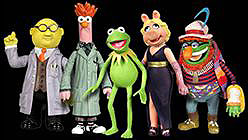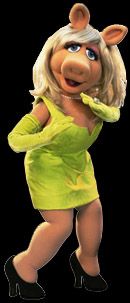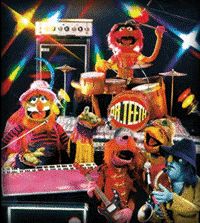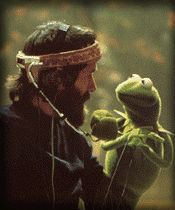| A
R T I C L E S |
New Collectibles •05/25 - NECA Sesame Street: Count Von Count Ultimate Action Figure
•04/25 - Reaction Sesame Street: Big Bird and Snuffy •03/25 - NECA Sesame Street: Ernie Ultimate Action Figure, Bert Ultimate Action Figure
•03/25 - Boss Studios Fraggle Rock: Boober Action Figure, Wembley Action Figure, Mokey Action Figure, Sprocket Action Figure •08/24 - Reaction Sesame Street: Big Bird, Mr. Hooper, Sherlock Hemlock, Super Grover |
||
|
|
|

The State of the Muppets
By Annika Abel
July 23, 2002
To say it is an uneasy time in the Muppet world is to grandly understate the situation.
 The
sale of the Jim Henson Company
looms as a huge unknown that may well determine Kermit and company’s
future. Brian Henson’s resignation
from his post as chairman of the JHC marked the end of an era. No longer
is the JHC a family company. No longer are the Hensons in charge of Jim’s
creations. The post-Jim transition period is over. The Muppets survived
the loss of the mastermind who gave them life. Now they face yet another
challenge: finding an owner who appreciates and respects their history
and has the vision and the wherewithal to seek out a future for them in
a highly competitive, expensive, cynical media.
The
sale of the Jim Henson Company
looms as a huge unknown that may well determine Kermit and company’s
future. Brian Henson’s resignation
from his post as chairman of the JHC marked the end of an era. No longer
is the JHC a family company. No longer are the Hensons in charge of Jim’s
creations. The post-Jim transition period is over. The Muppets survived
the loss of the mastermind who gave them life. Now they face yet another
challenge: finding an owner who appreciates and respects their history
and has the vision and the wherewithal to seek out a future for them in
a highly competitive, expensive, cynical media.
Perhaps the most disturbing news is the relocation and extreme down sizing of the New York workshop. Incredibly talented artisans who have been with the company for years are now gone. Who will care for the Muppets? Will the minuscule staff that remains be able to maintain Kermit and Piggy and all the rest? With a new series in development for Fox and a movie in production for NBC, why is JHC cutting the very people who make their stars?
What is going on behind closed doors at Henson? How are the financial constraints of current parent company EM.TV influencing decisions? Is there a connection between Brian’s exit and what appears to be the loss of virtually the entire New York workshop? Would a factory-style big corporation that churns out children’s entertainment with all the creativity and artistry of pulp novels take the time to lovingly and painstakingly hand paint Camilla on Gonzo’s necktie? What about the Sesame Street Muppets? What will happen when it is time for a new Grover? Will he be crafted by the lowest bidder?
As the Muppets face this crossroads, and Muppets fans nervously wait to see where the chips— or foam— fall, I feel compelled to take a closer look at what makes the Muppets unique, what raises them from puppets to cultural icons, and what pitfalls may lie ahead. Or, to put it another way, what scares me about the Muppet’s future.
 Characters
come and go. Television, film, and toy stores are over flowing with forgettable
creatures. Sure, Strawberry Shortcake and Smurfs pop up from time to time
in brief fits of nostalgia, but they aren’t lasting. No one is on
pins and needles awaiting the next Care Bear movie. Yet the Muppets remain
vital. Early indications of the success of Palisades
Toys’ Muppet action figure line suggest the Muppets are still
viable with the ability to be quite profitable.
Characters
come and go. Television, film, and toy stores are over flowing with forgettable
creatures. Sure, Strawberry Shortcake and Smurfs pop up from time to time
in brief fits of nostalgia, but they aren’t lasting. No one is on
pins and needles awaiting the next Care Bear movie. Yet the Muppets remain
vital. Early indications of the success of Palisades
Toys’ Muppet action figure line suggest the Muppets are still
viable with the ability to be quite profitable.
What lifts the Muppets from nostalgic relic to vibrant brand? For me, it is their sense of self. They aren’t puppets. They aren’t caricatures. They are fully developed beings with multidimensional personalities and strong connections to one another. They are a family in the best sense of the word. Sure, they bicker and tease, but at the heart of it, they truly care for one another. They don’t like Gonzo despite his fondness for painful activities or odd interest in mold. They don’t like him for who he could be or who they would like him to be. It isn’t about the potential they see in one another; it is about who they are, as they are. They are a merry band of misfits who delight in life. They are, unapologetically, themselves.
 Which
is why I am worried about Miss Piggy. Henson seems dangerously close to
changing her in a way that threatens her core. Piggy is not thin. Piggy
should not be thin. Our favorite foam diva works, in large part, because
her reality does not match her stereotype. A slender Piggy would have
nothing to check the attitude. It would be the Muppet equivalent of Cindy
Crawford whining about fat thighs. Miss Piggy needs to remain chubby to
remain lovable. She is the Muppet’s glamour queen despite being a
heavy set pig. Who wants a skinny pig, anyway? Where’s the fun in
that? Where is the humor in a skinny model and actress?
Which
is why I am worried about Miss Piggy. Henson seems dangerously close to
changing her in a way that threatens her core. Piggy is not thin. Piggy
should not be thin. Our favorite foam diva works, in large part, because
her reality does not match her stereotype. A slender Piggy would have
nothing to check the attitude. It would be the Muppet equivalent of Cindy
Crawford whining about fat thighs. Miss Piggy needs to remain chubby to
remain lovable. She is the Muppet’s glamour queen despite being a
heavy set pig. Who wants a skinny pig, anyway? Where’s the fun in
that? Where is the humor in a skinny model and actress?
Perhaps more importantly, what message is inherent in thinning Piggy? Thinner is better? Chubby can’t be beautiful? Piggy has always stood up for herself and her weight with a good karate chop to anyone who dares utter a snide comment. Why, after all these years, would she suddenly give in to societal pressures that idolize a ridiculous and often unhealthy body image? Piggy isn’t fat. She’s a pig. Miss Piggy needs to stay a pig. She needs to remain the diva we have come to love and, dare I say it, admire.
A great deal of pressure rests on Piggy’s shoulders. She is the lone main-character female Muppet. Even when Richard Hunt was with us, Janice was always a supporting character. Camilla is terrific, but she’s never going to rise to the levels of Fozzie and Pepe. Annie Sue has hardly been seen since the 70s ended. So Piggy is left to represent women more or less on her own. I would hate to see that representation become just another skinny model. The world doesn’t need that. A heavy set woman who is active, successful, and comfortable with herself? Now that we need.
A thinner Piggy is not the only change we’ve seen in recent years. Muppets From Space, the last Muppet movie, started out with a wonderful, Muppety note. The Muppets eased their way into a new day in the Muppet boarding house to the song Brick House. Sitting in the theater, watching that sequence at the first showing on opening day, I felt exhilarated. This was the Muppets as I remembered them. Silly songs and penguin hi-jinks.
 Unfortunately,
the Muppets weren’t singing. Imagine how much better that bit would
have been had the song been performed by the Electric Mayhem. Part of
the fun of a Muppet movie is the music. Fans covet their soundtracks.
We tune in to Muppet Central Radio.
Muppet music isn’t cutesy children’s songs, it is fresh with
just enough cynicism to keep it real. We miss it when it isn’t there.
Just as we miss Rowlf, Sam, Scooter and the myriad of other characters
who have been relegated to walk on-roles since Frank Oz has moved on and
Jim and Richard died.
Unfortunately,
the Muppets weren’t singing. Imagine how much better that bit would
have been had the song been performed by the Electric Mayhem. Part of
the fun of a Muppet movie is the music. Fans covet their soundtracks.
We tune in to Muppet Central Radio.
Muppet music isn’t cutesy children’s songs, it is fresh with
just enough cynicism to keep it real. We miss it when it isn’t there.
Just as we miss Rowlf, Sam, Scooter and the myriad of other characters
who have been relegated to walk on-roles since Frank Oz has moved on and
Jim and Richard died.
There are reasons for hope. Bill Barretta’s performance of Rowlf at MuppetFest last December. Piggy has found her voice. A bonanza of licensing agreements has led to the largest influx of Muppet merchandise in two decades. The new movie and series are beacons of light in this dark tunnel of Muppet unknowns.
Still, I have to wonder, could all of that fall apart if the company is not sold? Or if it is sold to a conglomerate that does not fully appreciate the Muppets?
Which brings us to Disney. I don’t want Disney to own the Muppets. A lot of people disagree with me. You can tell me I’m wrong, but you’re not likely to change my mind. Here’s why:
A) Muppets for preschoolers. Disney’s past experience with the Muppets indicates they view the Muppets as children’s fare. Look at the packaging for the initial Disney release of the first two movies. They came with plastic watches sized for children. Not to open another highly charged debate, but the lack of widescreen on the DVD Treasure Island release is another example. Kids are less likely to care about widescreen, it’s the adults who want it.
B) The lack of creativity. There have been times when Disney produced some amazing pieces of art (the classic cartoons made when Walt was in charge, even the string of films in the 80s and early 90s were pretty good). But those times are behind us. Disney is ruled by profits and churns out stock movies that can be merchandised endlessly and produced cheaply. At MuppetFest, former Muppet maker extraordinaire, Amy Van Gilder said what she misses most about JHC is the creativity. Van Gilder works for Disney.
C) It’s a bad fit. The Muppets are about a group of close knit, creative people working together to create something new and fun. We have all heard the stories of how Jim loved to be upstaged. How everyone was welcome to contribute and share ideas. Disney doesn’t work that way. Disney is a huge corporation which requires a lot of management to keep things moving. Sudden changes on the set because a puppeteer did something unique would not fly. This isn’t a criticism of Disney, it is the natural side effect of such a large organization. However, I think it could turn the Muppets into cartoonish skeletons of their former selves.
Personally, I’d like to see the Muppets owned by a company that has the funds to both produce and promote Muppet movies, but will take a hand’s off policy in terms of the day to day operations of JHC. The creative side of the company could do with some polishing, but over all it works. It shouldn’t get retooled to fit into an existing corporate structure that wasn’t designed for the unique needs of the Muppets.
 Ultimately,
what makes the Muppets the Muppets is the people behind them. In 1978,
Robert MacKenzie wrote for TV Guide, “A Muppet, when you get down
to it, is somebody’s arm in a piece of cloth. But Jim Henson and
his puppeteers invest their little characters with love, which is the
same as making them live.”
Ultimately,
what makes the Muppets the Muppets is the people behind them. In 1978,
Robert MacKenzie wrote for TV Guide, “A Muppet, when you get down
to it, is somebody’s arm in a piece of cloth. But Jim Henson and
his puppeteers invest their little characters with love, which is the
same as making them live.”
The thing is, it isn’t just the puppeteers—it is every one involved that makes the Muppets live. They are created with love. From the initial character sketch, to the clothing, to the puppeteer; it is the love and respect all of these talented people have for the Muppets and for the work they do that makes the Muppets the Muppets. Let’s hope they find a home that understands that.
|
|
|
home | news | collectibles | articles | forum | guides | radio | cards | help
Fan site Muppet Central created by Phillip Chapman. Updates by Muppet
Central Staff. All Muppets, Bear
Muppet Central exists to unite fans of the Muppets around the world. |